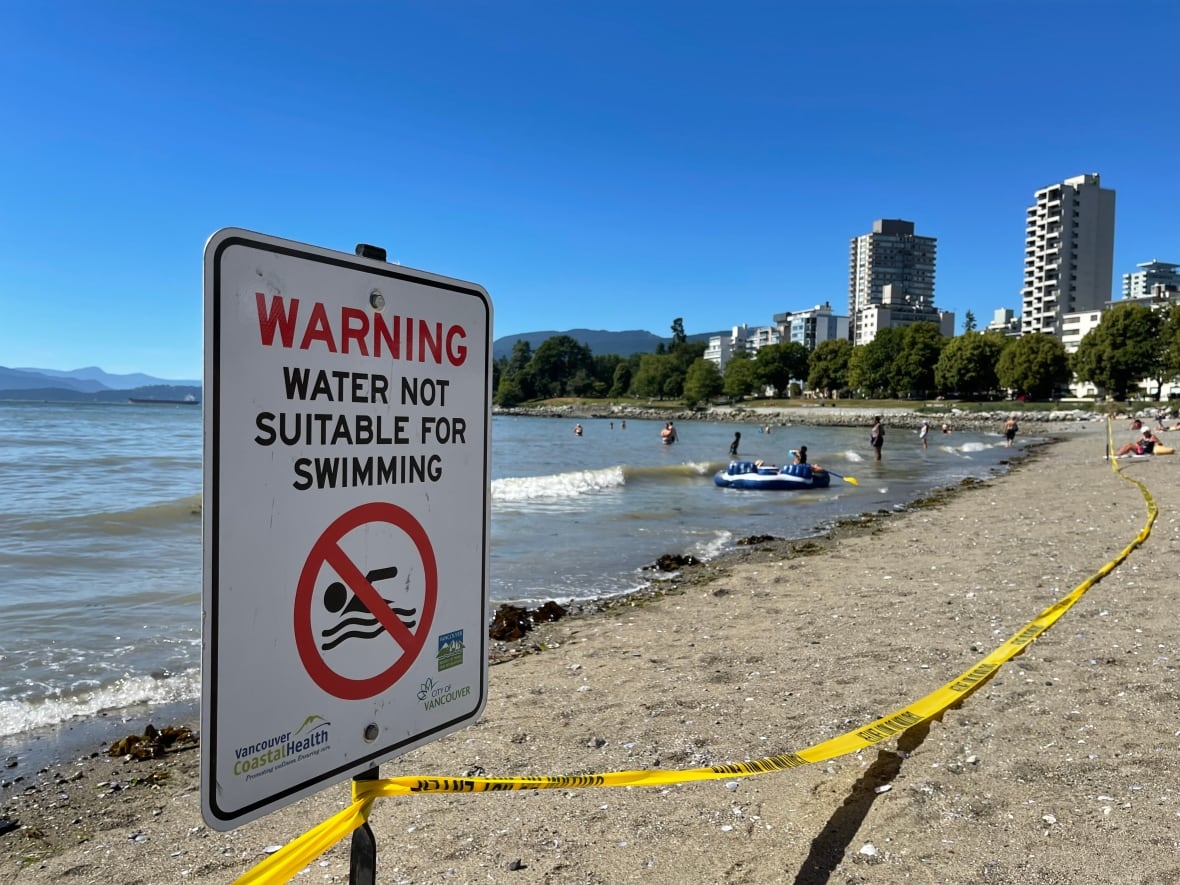Several Vancouver beaches remain closed for swimming ahead of big event weekend
9 beaches around Vancouver are designated as 'not suitable for swimming' due to E. coli
On a weekend shaping up to be full of festivities around the beach, including the Vancouver Folk Music Festival and the Honda Celebration of Light fireworks, officials are warning people to stay out of the water in some popular areas.
Nine beaches around Vancouver are currently designated as "not suitable for swimming," due to unsafe levels of E. coli, according to Vancouver Coastal Health (VCH):
- Ambleside Beach.
- Wreck Beach.
- English Bay.
- Kitsilano Beach.
- Second Beach.
- Sunset Beach.
- Third Beach.
- Lions Bay.
- Trout Lake.
Three more beaches have E. coli levels that were higher than expected in samples, though swimming is not restricted:
- Dundarave Beach.
- Sandy Beach.
- Eagle Harbour.
Michael Schwandt, medical health officer at VCH, said it's uncommon to have this many beaches not suitable for swimming at the same time.
"Normally, we might see one or more beaches within that status at a given point in time, but not very commonly do we see so many all at the same time," Schwandt said.
There are a number of possible contaminants, according to Schwandt, including runoff from sewers or leaking sewage, as well as discharge from boats or animal sources like dogs and birds.
"We're working with the local and regional government to further examine that."
Schwandt said there's been more reports of recreational boating in the area, particularly with the weekend's upcoming festivals, and suggested discharge from boats could be contributing to the increased levels of E. coli.
Gregary Ford, vice-president of Swim Drink Fish Canada, an environmental charity focused on connecting people with water, noted E. coli is a natural bacteria found in the water, one that's frequently an indicator of "human fecal waste."
It has the potential to cause human gastrointestinal illnesses, ear infections, eye infections and skin infections, according to Ford.
"It's an unpleasant way to spend the day after a lovely day at the beach."
He noted combined sewers, in which sanitary sewers and storm sewers are combined into a single pipe that directs the water to a treatment facility, are one way E. coli can enter local waterways.
The systems are designed to overflow into water bodies like lakes and rivers, so they don't overflow back into streets or basements.
"But what that means is that sometimes we are depositing this deleterious substance directly into the waters that people frequent for swimming, drinking or fishing."

Ford said investing in infrastructure to separate storm and sanitary sewers is a long-term and expensive solution, so many municipalities are also investing in low-impact green infrastructure that can reduce the amount of runoff water entering the sewer system, such as rain barrels, stormwater ponds, bioswales (which carry stormwater to another location) or rain gardens.
Ford said climate change means warmer temperatures and more intense, frequent rainfall are predicted.
"It's critical that we bring this into the conversation, because as our climate starts to change and these rainfall events become more common, those are things that we need to keep in mind moving forward regarding how we effectively manage our stormwater."
Stephen Paetkau of Skookum Yacht Services operates a free mobile pump-out service for the City of Vancouver to pump out "black water" from boats out to the city's sewer.
He said there hasn't been much of an increase in customers for the pump-out service recently.
"It's been pretty static for the last seven or eight years," he said.
He said he was unsure if people are dumping waste from their boats.
"It's literally something you have to be in the water to watch it happen in order to know it's happening."
He said the boating community is also likely "better behaved" now than a decade ago, but noted there's little enforcement of Transport Canada's rules on dumping waste.
With files from Meera Bains and Yasmine Ghania